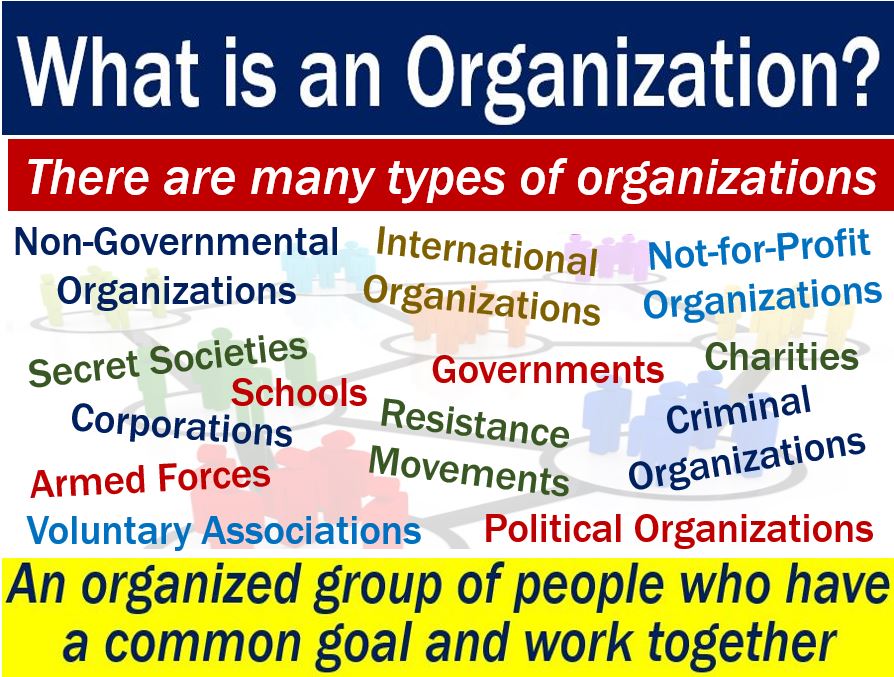Organization – definition and meaning
An organization is an organized group of individuals. The group has a particular purpose, such as a government department or a business. The term ‘organization’ can also refer to the act of organizing something. People work together in an organization for a common purpose. In other words, the members of the group have collective goals.
Organizations all have a management structure. That structure determines what the relationships are between different members and activities.
The Cambridge Dictionary has the following definition of the word ‘Organization’:
“A group of people who work together in an organized way for a shared purpose. The planning of an activity or event.”
According to TheLawDictionary.com, an ‘Organization’ is:
“A group of people, structured in a specific way to achieve a series of shared goals.”
Etymology of ‘organization’
The Online Etymology Dictionary says that the term emerged in the English language in the mid-fifteenth century. In the mid-15th century, it meant ‘act of organizing.’ The word came from Middle French Organisation, which came directly from Medieval Latin Organizationem. In 1873, it assumed the meaning ‘system, establishment.’
The word originally came from the Greek Organon, which means ‘organ.’
Etymology is the study of the origin of words and how they have evolved.
In British English, the word is spelled with an ‘s’ in the middle – for example, ‘organisation.’

Organization – different types
There are hundreds of different types of organizations. For example, governments and companies are organizations. There are also political organizations and non-governmental organizations (NGOs).
Charities, the armed forces, partnerships, cooperatives, schools, and universities are organizations.
Organizations function either in the public or private sectors. However, hybrid organizations work simultaneously in both. In other words, they fulfill public duties as well as operating in the marketplace.
If they consist of volunteers, we call them voluntary organizations or voluntary associations. Voluntary associations can usually operate without legal formalities.
Some organizations operate in secret. For example, organized crime comprises many criminal groups that work together in illegal activities. Secret societies operate ‘under the radar’ or ‘underground.’ Some resistance movements have members who meet secretly.
Organizational theory is all about the relationship between organizations and their environment.
We call the study of how we create and develop organizations organizational economics. Organizational economics also looks at how organizations affect economic growth.
Modern Changes in Organizations
Organizations have undergone major changes since the turn of the century. Today, there is much more communication between the different levels of the corporate hierarchy, i.e., bosses are more in touch with their workers than in the past.
During the coronavirus pandemic (COVID), millions of people transitioned to working from home. Many of them still work remotely.
Given these shifts, organizations have had to adapt accordingly.
Compound words using ‘organization’ or ‘organizational’
We can create dozens of compound words or phrases with the terms ‘organization’ and ‘organizational.’ Here are fifteen of them:
- Organization Chart
- Organizational Behavior
- Organization Development
- Organizational Culture
- Organization Design
- Organizational Dynamics
- Organization Management
- Organizational Change
- Organization Leadership
- Organizational Strategy
- Organization Systems
- Organizational Process
- Organization Framework
- Organizational Efficiency
- Organization Policy
In other languages
The term ‘Organization’ is Organización in Spanish, Organisation in French, Organisation in German, Organizzazione in Italian, 组织 (Zǔzhī) in Mandarin Chinese, संगठन (Sangathan) in Hindi, Организация (Organizatsiya) in Russian, منظمة (Munazzama) in Arabic, সংস্থা (Songstha) in Bengali, Organisasi in Indonesian, 조직 (Jojik) in Korean, سازمان (Sazman) in Persian, Organização in Portuguese, องค์กร (Ongkorn) in Thai, Tổ chức in Vietnamese, సంస్థ (Sanstha) in Telugu, and ਸੰਗਠਨ (Sangathan) in Punjabi.
Video – What is an Organization?
This video comes from our YouTube collection in our sister channel ‘Marketing Business Network.’

